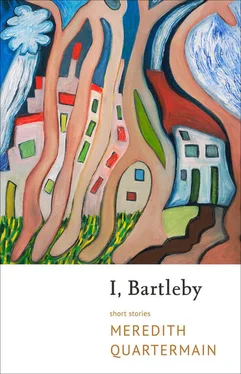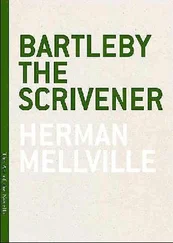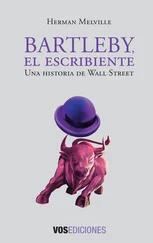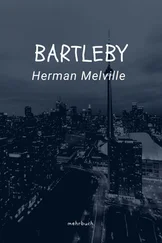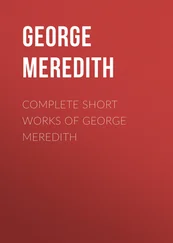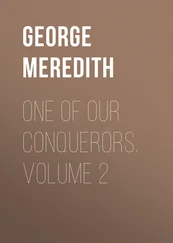Meredith Quartermain
I, Bartleby
“Bartleby,” said I, gently calling to him behind his screen.
No reply.
“Bartleby,” said I, in a still gentler tone, “come here; I am not going to ask you to do any thing you would prefer not to do — I simply wish to speak to you.”
Upon this he noiselessly slid into view.
“Will you tell me, Bartleby, where you were born?”
“I would prefer not to.”
Herman Melville, “Bartleby, the Scrivener: A Story of Wall Street”
am a copyist, what am I copying? Down or over. From what page to what page. The flow of ink through the nose of the pen replicating reptilely the tick of a clock turning into another alleyway of lines or mind running down grammatical streets — ever outward like a river through all the islands and channels of its delta after pitching itself downward from mountains and, even before that, from glaciers that had oozed fingers into high valleys but now are said not to be oozing but rather shrinking away from those mountain crags — those humps and hulks and heaved-up layers of ancient seas, jumbled quixotics, masked tectonic rafts of rock my pen makes into loops and sticks and dots.
They shrink from a hot stove, from an odious task, from drudgery, from admitting they’re no longer wanted — these glaciers — no longer loved by the mountains. No. The mountains have had enough, and these glaciers must leave, must melt away, must sink into sedimentary, metamorphic, and igneous fissures, cracks, and fractals of mountainhood and meadowhood. Slowly, ever so slowly pulling away the blankets and sheets — inch by inch sliding back the antimacassars on mountainous couches and chairs once protected from human oil but now gradually subjected to this pulling away of garments, this peeling back of scarves and coats, this drawing down of sweater sleeves and chemises, this relentless baring of mountain flesh despite snatches at collars and cuffs, fringes and hems, despite the pocketing of a sash or a sock, a garter or culottes that nevertheless melt trickle pour and hurl themselves down as if under a truck.
Can mountains think of trucks? Humans think not. Mountains leave the question open, preferring to send it as a wave of photons from a star to the universe. To end on a distant planet, an asteroid, light centuries deep in some far-off galaxy of ideas. Mountain thoughts. Could come to rest on a speck of sand in a camel’s eye — an eye that may not look kindly on the kid it has given birth to. That may not allow the kid to suckle. An I that curls her velvety camel lips and gazes across the steppes while her owner walks five miles to the next yurt and brings back the violinist — the owner and his wife and their five children gathering round the camel in a man-holding- animal-huddle of hoof-stomp and dung and windblown hair, the violinist drawing his bow across his strings until slowly from the eye of the camel seeps a tear.
write about Schubert without knowing more. I will just say today is his birthday. I imagine that at age seven it would have been a very important day for him. He was already playing violin and piano. His brothers and sisters were getting born and dying. Father and mother and the ones still alive gathered before soup plates in a room lined with cabinets. Father schoolteacher. Mother mother. He would have cake. He would sing so much that a very important gentleman would give him singing lessons. He would run off to the piano factory owned by the father of his friend and play every instrument in the showroom.
As fast as he could think them, Schubert would write songs and symphonies and sonatas. Scherzos, rondos, adagios, marches. Con brio. Con fuoco. Rallentando. Dolce. Estinto. Fortissimo. Allargando. Mezza voce. Minacciando. Flowed from his fingers. Sesquipedalian motifs. Palindromic crotchets. Acrostic syncopations. Metonymic diphthonged sibilants. Conjugations of rhymed chords and intervals. In the house of a wealthy man where he taught the daughters their piano lessons. For a year. But had to go back to teaching children in his father’s school.
He was arrested with friends for mouthing off to police. One friend banished forever from the city. Schubert set his friend’s poems to music. He wanted to marry a soprano — he wrote songs for her, but couldn’t prove he could support a family. Her family kept bundles of his music for decades. Until perhaps some descendant wanted to throw out these yellowing pages of scribbled notes, so that he could rent out his attic and his basement. To a musician or painter or poet. Lost to les couleurs. Perdu dans l’aubergine, la carotte, le pain grillé, la tomate, la moutarde. They don’t give a damn about charging rent.
Le sang, la violet, le vin, la tourterelle spread out their piazzas free of charge, day and night, for anyone to stroll or caper in. Embracing in their ghostly pavements vibrations of flesh and breath. The soles of the strollers and dancers pummel these agoras and forums filling them like goatskins. They stroke and nudge their diaphanous slates, stretch and rub their paving hugs. Urgence to fluctuating cobbles.
Schubert died at thirty-one. Of typhoid or syphilis. On his 214th birthday the trout in his quintet flash their rainbow scales in the streams of my car radio driving past the Holy Rosary Cathedral, where a man twists and lolls, careens out, almost tips his wheelchair as he blindly sweeps an upturned cap this way and that.
A Natural History of the Throught
Violet. Opposite yellow on the colour wheel. Also a flower written about by Robin Blaser. Songs say they are blue, suggesting sky or someone’s mood. Can colour be ironic? A droll black or a meant-to-be-read-two-ways green? If you are a man wearing a pink jacket or, heavens to Betsy, you dress your baby girl in blue? Je pense que tout le monde should be addressed Mister , including baby girls and breastfeeding moms. If everyone wore blue, according to psychologists, our thoughtfulness would be encouraged. We would see a decline in outbursts of verbiage that leave you wondering, What was that all about? Seeing blue on our social associates, we’d be inclined to credit them with having the ability to put two and two together. We’d look before we leapt to conclusions about lack of brain capacity.
I don’t really like where this line of thoughtlessness is going. Because in fact I’ve lost my train of thought. How indeed does one lose a whole train? Entraîner en français : to drag down. My train sunk in a violet pool — no, something far bigger. It’s sunk in a violet sea. A train of camels nose to tail plodding one hoof in front of another dragging my thought across an empty desert of sky and sand. Not to a violet sea but out to the whiteness at the edge of the desert. Whiteness of page already sliced with lines waiting for the train of camels to make pictures in the eye of a beholder through which a thread is needled.
A simple t separates through and a thinking throught, which once rhymed with fruit or newt , but now rhymes with caught and fraught . Halt — the ones at the edge of whiteness. Then seriatim stoppages of camel humps déroulent backward to my throught’s ancestor and the ancestor of that ancestor. It being not so much a throught line with an engine and a caboose as a series of births or reproductions. Camels not actually walking, unless perhaps the desert moves under them, but camel pasting a camel in front of it and that camel in turn pasting one in front of it — the train growing longer pushes apart whiteness at either end and lets the thinker walk up and down her caravan.
Читать дальше
